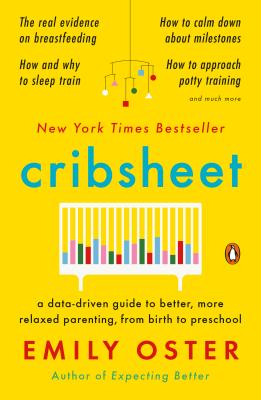
Cribsheet: A Data-Driven Guide to Better, More Relaxed Parenting, from Birth to Preschool
Emily Oster
About the Author

Emily Oster
Questions & Answers
Emily Oster employs data and economic principles to inform parenting decisions by analyzing research and evaluating the costs and benefits of various choices. She emphasizes the importance of considering both data and personal preferences, advocating for a balanced approach that acknowledges the limitations of data and the uniqueness of each family's situation.
Oster's approach has several implications for parents:
-
Informed Decision-Making: Parents can make more informed choices by understanding the data behind common parenting practices, reducing the influence of myths and unfounded advice.
-
Flexibility: Recognizing that there is often more than one "right" answer, Oster encourages parents to be flexible and adapt their decisions to their family's specific needs and preferences.
-
Reduced Parenting Stress: By focusing on evidence-based information and personal values, parents can reduce the stress associated with the overwhelming amount of parenting advice available.
-
Empowerment: Oster's approach empowers parents to trust their instincts and make decisions that align with their values and circumstances, fostering a more confident and relaxed parenting experience.
The research on breastfeeding suggests that while it is associated with better outcomes like lower obesity rates and better school performance, the causality is complex due to confounding factors like maternal education and income. Sleep training, particularly the "cry it out" method, is effective in improving sleep for both infants and parents, but it's crucial to be consistent and have a plan. Regarding other practices, early exposure to peanuts can reduce peanut allergies, and there's limited evidence on the benefits of early introduction to solid foods. Oster's recommendations emphasize evidence-based decision-making, considering the data while acknowledging the unique circumstances of each family.
Emily Oster addresses the 'Mommy Wars' and societal pressures by emphasizing the importance of informed decision-making and personal preferences. She argues that while data can provide insights, it doesn't dictate the right choice for every family. Oster proposes solutions like:
- Informed Decision-Making: She encourages parents to consider data and research but also to weigh their personal preferences and family circumstances.
- Open Communication: She suggests that parents should discuss their choices openly and support each other's decisions, rather than engaging in judgmental debates.
- Flexibility: Oster advocates for being open to changing one's mind based on what works best for the family.
- Self-Care: She emphasizes the importance of taking care of oneself, including mental health, to be a better parent.
- Support Networks: She recommends seeking support from friends, family, or professionals when needed.
By focusing on these solutions, Oster aims to reduce the stress and anxiety associated with parenting and societal expectations.
Emily Oster emphasizes that parents' personal preferences significantly influence decision-making in parenting. She encourages parents to consider their own needs alongside those of their children by illustrating the importance of individual preferences through real-life examples and decision-making frameworks. Oster advocates for a balanced approach, where data and research provide a foundation, but personal values and preferences guide the final choices. She encourages parents to weigh the costs and benefits, including the opportunity cost of their time, and to make decisions that align with their unique circumstances and desires, fostering a more informed and less stressful parenting experience.
The book "Cribsheet" contributes to a nuanced understanding of parenting by providing a data-driven approach to common parenting decisions. Emily Oster, an economist, analyzes research on topics like breastfeeding, sleep training, and discipline, showing that there is often more than one "right" answer. This approach encourages parents to consider both data and personal preferences, fostering a sense of informed autonomy.
The potential long-term benefits of Oster's approach include:
- Reduced Parental Stress: By providing context and evidence, parents can make decisions that align with their values and reduce the pressure of "perfect" parenting.
- Improved Parent-Child Relationships: Understanding the data behind parenting choices can lead to more empathetic and supportive parenting styles.
- Enhanced Decision-Making Skills: Parents learn to evaluate information critically, which can be beneficial in various aspects of life beyond parenting.
- Increased Confidence: Knowing that there are multiple valid approaches to parenting can boost parents' confidence in their choices.